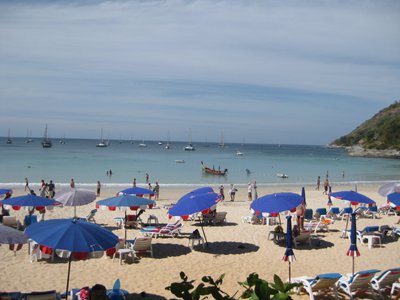OPINION: Phuket’s Battle for the Beaches – a poster child in distress

PHUKET: Much of Phuket’s allure as a leading resort destination in Asia is its number of beaches. Put shopping in the bag, along with Bangkok, and Thailand’s second most vital generator of tourism demand is the motion of the ocean.
Views and proximity to the water are catalysts for real-estate values, accelerated sales and capital appreciation. Premium residential and hotel-managed properties along the coastline continue to top the transaction charts.
Recent Phuket Gazette coverage of the eviction of a long-standing beach establishment at Karon, and the case of a controversial eatery on Surin Beach, which is battling with the local municipality over encroachment on public land, has highlighted the growing row over what can and cannot be done on the precious ocean frontage.
I was recently able to view video footage and photographs of the forced eviction of an oceanfront outlet, and I have to say that the impassioned pleas of the operator tugged more than a few emotions as he was virtually dragged away from his only livelihood.
Beachfront squatters and businesses have a long and controversial history on the island. For years, Laguna Phuket has been waging a battle to clear the beaches in front of its array of luxury resorts. Down in Rawai, the saga of the sea gypsies continues to this day.
Phuket’s beaches are these days more than ever a battleground between the economically challenged, local government authorities, private businesses and what some refer to as “mafia-like syndicates”.
On Phuket an invasion of sun loungers for hire, restaurants and massage huts, as well as parasailing, jet-ski and tuk-tuk operators, is a governing force. Commerce and paradise have become strange and often violent bedfellows.
While nearby Krabi has been able to maintain an equilibrium and mostly control the urbanizaton of its public beaches, Phuket is a poster child in distress.
Pure economics and growing inflation show a widening spread between the ‘haves’ and the ‘have-nots’. Yet there has been no consistent provincial governance over what is essentially tourism’s golden goose.
Taking a step backward and comparing the situation to Asia’s other resort top gun, Bali, a similar disconnect can be seen between individual regencies and a guiding governor’s position. There has been similar, widespread abuse and a lack of consistent application of the law of the land.
A sustained build-up of illegal businesses on Phuket’s beaches has been under way for more than two decades, and adopting a holistic approach to bring order and fairness to all concerned is a high-minded aim. But what may perhaps be more practical is a consideration of what happens next, as tourism continues to ramp up.
Will future visitors be able to find a place to even stand on a beach without bumping into a sun lounger or a jet ski? And what about Thais who want to bring their families to the ocean for a swim?
It’s without a doubt a provocative situation and one that many believe will be the cover story for this coming high season, as clashes look set to continue. So many questions and so few answers continue to cloud the horizon of what is one of the kingdom’s true treasures.
— Bill Barnett
Latest Thailand News
Follow The Thaiger on Google News:


























